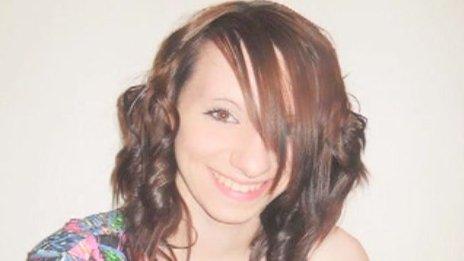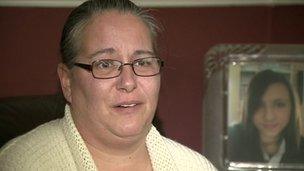Kettering Hospital 'lost chances' to save blood loss girl
- Published

Victoria Harrison was found unresponsive the morning after routine surgery
A teenager's chances of survival after routine surgery would have significantly increased had opportunities to treat her not been lost, a coroner has said.
Victoria Harrison, 17, had an appendix operation at Kettering General Hospital on 15 August last year.
She suffered blood loss and was found unresponsive the next morning.
Northants Coroner Ann Pember said it was possible a deterioration would have shown had she been regularly monitored.
Miss Harrison, a trainee beautician from Irthlingborough, Northamptonshire, had been referred to the hospital by her GP with suspected appendicitis.
She underwent keyhole surgery to remove her appendix on the afternoon of 15 August and during the operation an artery was damaged.
Observation 'failures'
Surgeon Shady Hosny told the inquest he rectified the bleed and that Miss Harrison had lost 200ml of blood - with 50ml being a normal loss during surgery.
The operation was a success and Miss Harrison - known as Tor - was returned to the ward, the hearing was told.

Tracey Foskett said she had lost her best friend
She was found pale and unresponsive by a care assistant at 05:30 BST the following day, and failed to respond to CPR.
The inquest heard from nurse Gillian Joy that nursing staff did not routinely read medical notes and often could not decipher a surgeon's handwriting.
In her narrative verdict, Ms Pember said: "There was a poor handover from theatre staff to the recovery nurse and in turn to the ward staff, in particular concerning the bleed which had occurred and been rectified in surgery.
"There was a failure to carry out appropriate post operative observations. Tor's last written formal observations were at 8.15pm.
"There was a further failure to conduct a formal observation following the introduction of morphine.
"Had Tor's observations been monitored at regular intervals, including pulse and blood pressure, it is possible that deteriorating trend may have been recognised."
"Windows of opportunity to treat Tor were lost - had these been acted upon the outcome may have been different.
"I believe her chances of survival would have significantly increased," she said.
Speaking to Miss Harrison's mother, Tracey Foskett, she added: "As a mother of two daughters, who like you are my best friends, I cannot imagine your grief and distress at the the loss of your beautiful Tor.
"I am truly so sorry."
Speaking to the BBC, Ms Foskett, said: "A mother shouldn't lose her child. I've lost my best friend.
"I can't ring and talk to her when I feel like it. After she died I rang her a few times, forgetting. Every morning I would wake up thinking 'it was just a dream'."
- Published9 December 2013